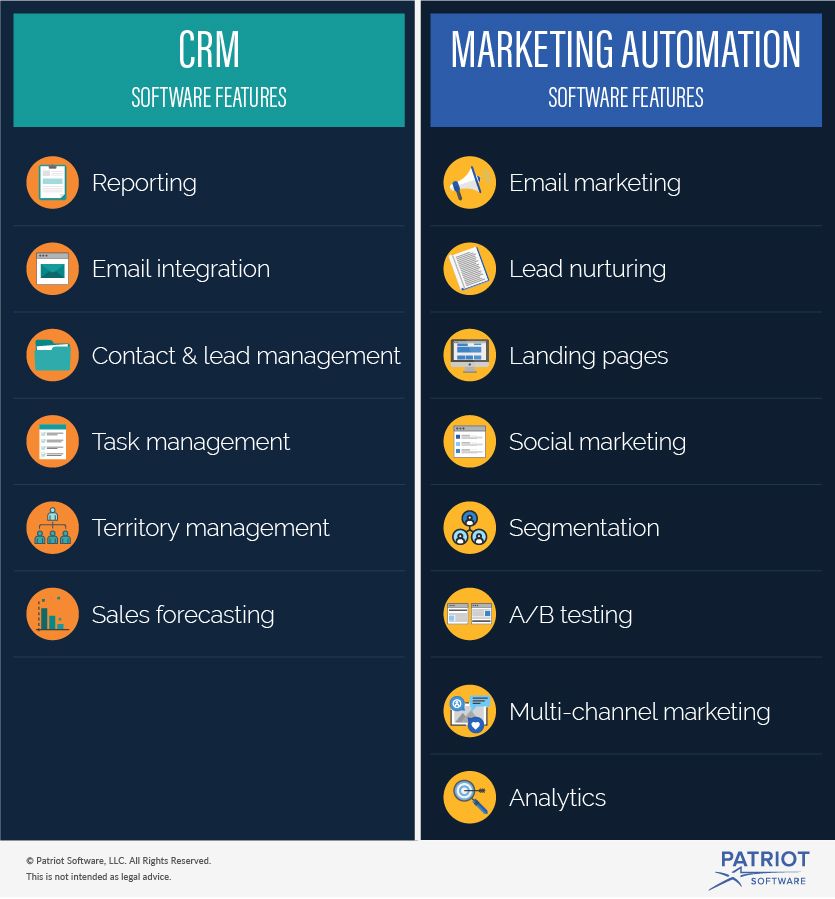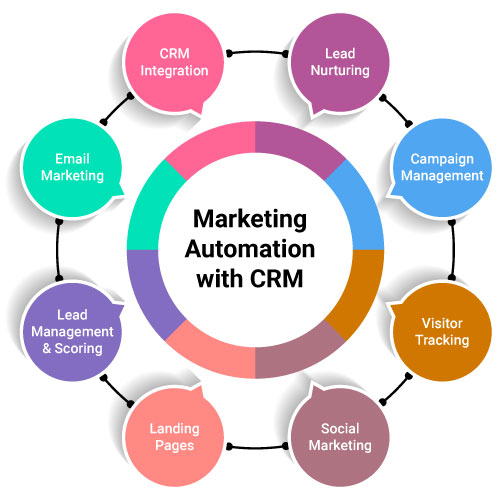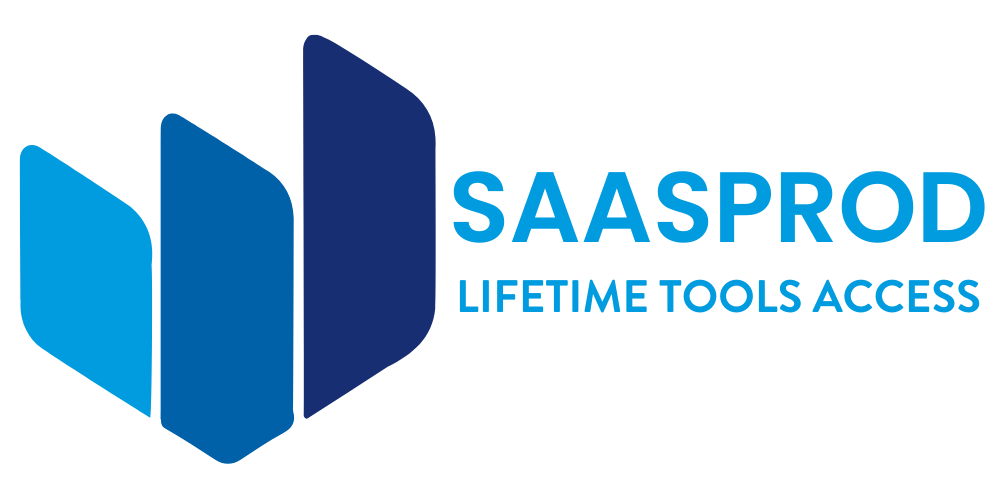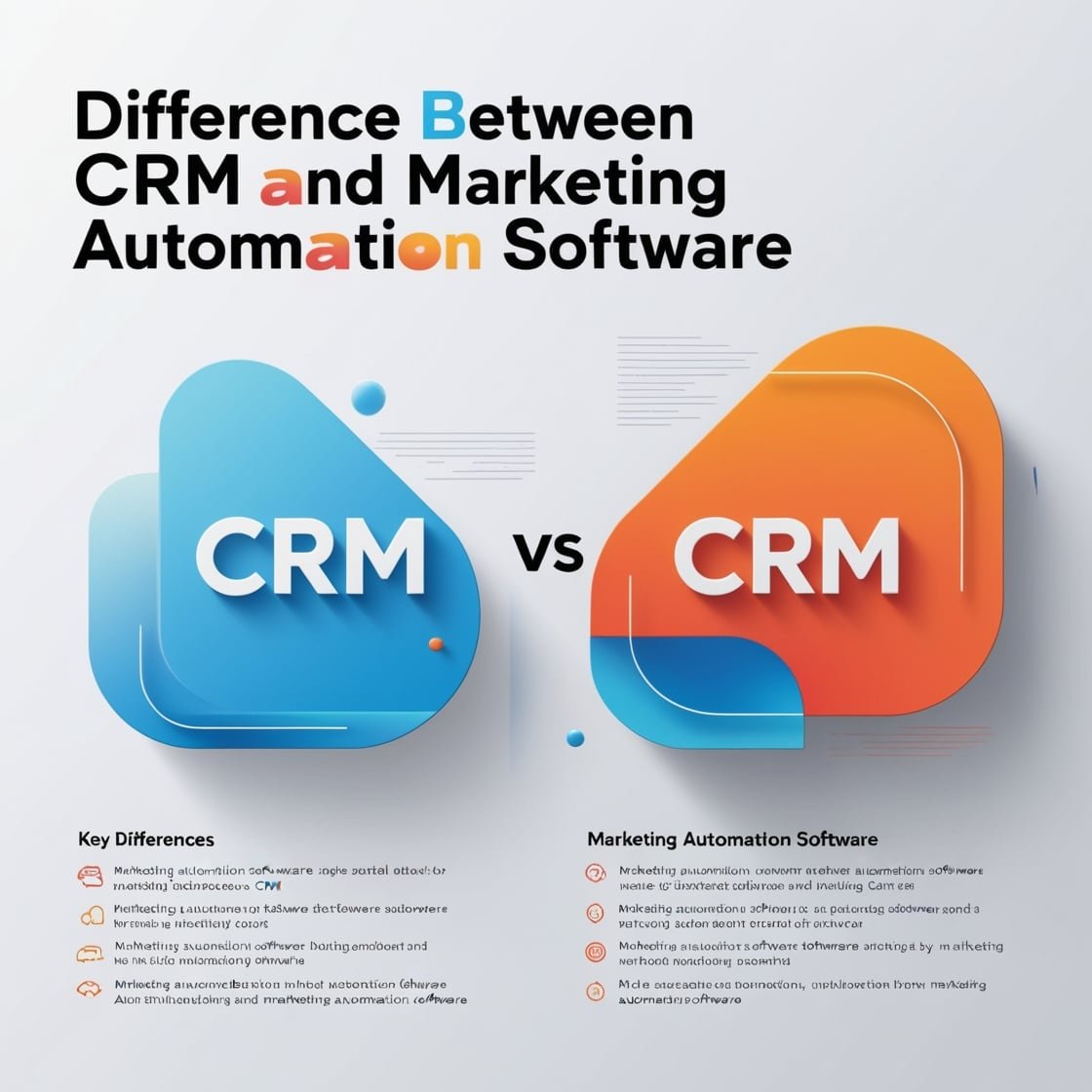CRM and marketing automation software serve different but complementary purposes. Understanding the differences can help businesses choose the right tool.
CRM, or Customer Relationship Management, focuses on managing customer interactions and data. It helps businesses keep track of customer information, sales, and support activities. Marketing automation software, on the other hand, automates marketing tasks. This includes email campaigns, social media posts, and lead nurturing.
While both tools aim to improve business efficiency, they do so in distinct ways. Knowing the difference between CRM and marketing automation software can save time and resources. This understanding can lead to better customer relationships and more effective marketing efforts. In this blog post, we will explore these differences in detail. This will help you decide which tool is best suited for your business needs.

Credit: encharge.io
Introduction To CRM And Marketing Automation
Understanding the difference between CRM and Marketing Automation Software can transform your business strategy. Both tools are essential for managing customer relationships and automating marketing tasks. However, they serve different purposes and offer unique benefits.
What Is CRM?
Customer Relationship Management (CRM) software helps businesses manage interactions with current and potential customers. It keeps track of customer data, sales, and interactions in one place.
Key features of CRM software:
- Contact management
- Sales management
- Customer service and support
- Task management
CRM systems aim to improve customer relationships. They help businesses understand customer needs and behaviors.
What Is Marketing Automation?
Marketing Automation software streamlines and automates marketing tasks and workflows. It helps businesses nurture leads and convert them into customers.
Key features of Marketing Automation software:
- Email marketing
- Social media management
- Lead scoring and nurturing
- Analytics and reporting
Marketing Automation tools focus on automating repetitive marketing tasks. They ensure efficient marketing campaigns and better engagement with prospects.
| Feature | CRM | Marketing Automation |
|---|---|---|
| Main Purpose | Manage customer relationships | Automate marketing tasks |
| Focus | Sales and customer service | Lead nurturing and campaigns |
| Key Features | Contact management, sales tracking | Email marketing, lead scoring |
Understanding these differences will help you choose the right tool for your business needs.
Core Functionalities
Understanding the core functionalities of CRM and Marketing Automation Software is essential. These tools serve different purposes. They also have unique features. Knowing these differences helps in making an informed choice.
CRM Features
CRM, or Customer Relationship Management, focuses on managing customer interactions. It helps in tracking customer information. This includes contact details and communication history. CRMs also help in managing sales pipelines. Users can track the stages of a deal. This makes it easier to forecast sales. CRMs often come with reporting tools. These tools provide insights into sales performance. They also help in identifying trends.
Another key feature is customer support management. CRMs enable tracking of support tickets. Users can also manage customer feedback. This improves customer satisfaction. Integration with other tools is also common. For example, email, calendar, and social media platforms. This ensures all customer data is in one place.
Marketing Automation Features
Marketing Automation Software, on the other hand, focuses on automating marketing tasks. It helps in managing email marketing campaigns. Users can create and send emails to a large audience. This saves time and effort. Marketing automation also includes lead nurturing. This involves sending targeted content to leads. The goal is to convert them into customers.
Another important feature is analytics. Marketing automation tools track the performance of campaigns. Users can see which campaigns are successful. This helps in making data-driven decisions. Social media management is another feature. These tools schedule posts and track engagement. This ensures a consistent online presence. Integration with CRM is also possible. This allows for seamless data flow between marketing and sales teams.
Key Differences
Understanding the difference between CRM and marketing automation software is crucial. Both tools help businesses grow but serve different purposes. Let’s explore their key differences.
Focus Areas
CRM software mainly focuses on managing customer relationships. It helps track interactions and improve customer satisfaction. On the other hand, marketing automation software aims to streamline marketing tasks. It automates emails, social media, and campaign management.
CRM tools often include features like contact management and sales pipeline tracking. They help sales teams close deals faster. Marketing automation software, however, focuses on lead generation and nurturing. It helps marketing teams create and send targeted messages.
User Base
The primary users of CRM software are sales teams. They rely on CRM to manage customer information and track sales activities. Customer service teams also benefit from CRM tools. They use it to resolve issues and maintain customer satisfaction.
Marketing automation software is mostly used by marketing teams. They use it to run campaigns, segment audiences, and analyze marketing performance. It helps marketers save time and increase efficiency.
Integration Capabilities
Understanding the integration capabilities of CRM and marketing automation software is essential for maximizing business efficiency. These tools can work together to streamline processes, improve customer interactions, and enhance marketing strategies. Let’s explore how connecting these systems can benefit your business.
Connecting CRM And Marketing Automation
Integrating CRM with marketing automation software allows data to flow seamlessly between sales and marketing teams. This connection ensures that both teams have access to the same information, leading to more coordinated efforts.
Here are some key integration points:
- Lead Management: Automate lead capture and tracking.
- Customer Data: Share customer details across platforms.
- Campaign Tracking: Monitor campaign success in real-time.
Integration helps in maintaining a consistent customer experience by keeping all teams informed and aligned.
Benefits Of Integration
There are numerous benefits to integrating CRM and marketing automation systems:
- Improved Efficiency: Automation reduces manual tasks.
- Better Data Insights: Access comprehensive customer data.
- Enhanced Collaboration: Align sales and marketing strategies.
These benefits translate to more effective marketing campaigns and stronger customer relationships. Integration simplifies the management of customer interactions and marketing efforts, leading to better business outcomes.
| Feature | CRM | Marketing Automation |
|---|---|---|
| Lead Tracking | Yes | Yes |
| Customer Data Management | Yes | No |
| Email Campaigns | No | Yes |
In summary, integrating CRM and marketing automation is crucial for a streamlined, efficient, and effective business strategy. This combination allows for better data sharing, improved team collaboration, and enhanced customer experiences.
Use Cases
Understanding the difference between CRM and marketing automation software is essential. Each tool serves specific purposes and fits unique business needs. This section will explore the use cases for both CRM and marketing automation software. Knowing these use cases helps you choose the right tool for your business.
CRM Use Cases
CRM software is perfect for managing customer relationships. It helps track customer interactions and sales activities. Businesses use CRM to store customer data, including contact details and purchase history. This data can improve customer service and personalize communication.
Sales teams benefit greatly from CRM systems. They can follow up on leads and manage pipelines more effectively. CRM software also assists in forecasting sales and setting targets. It provides insights into customer behavior, aiding in making informed decisions.
Support teams also use CRM tools. They track customer issues and ensure timely resolution. This improves customer satisfaction and loyalty. CRM software can integrate with other systems, providing a complete view of customer interactions.
Marketing Automation Use Cases
Marketing automation software focuses on automating marketing tasks. It helps manage email campaigns, social media posts, and lead generation. This software can segment audiences based on behavior and preferences. Marketers use it to send targeted messages at the right time.
One key use case is nurturing leads. Marketing automation tools can send automated follow-up emails. This keeps leads engaged and moves them through the sales funnel. It also tracks the performance of marketing campaigns, providing valuable insights.
Another use case is managing and scoring leads. The software can assign scores based on interactions and behavior. This helps prioritize leads and focus on those more likely to convert. Marketing automation also aids in content marketing. It schedules posts and tracks engagement across different channels.

Credit: smallbusiness.patriotsoftware.com
Choosing The Right Tool
Choosing the right tool between CRM and marketing automation software can be challenging. Each tool offers unique benefits. Understanding these can help you make an informed decision. Let’s explore the key factors to consider.
Business Needs
First, assess your business needs. CRM software focuses on managing customer relationships. It tracks interactions, sales, and customer history. This tool helps sales teams work efficiently. On the other hand, marketing automation software streamlines marketing tasks. It automates email campaigns, social media posts, and lead generation. This tool helps marketing teams save time and increase efficiency.
Scalability
Scalability is another crucial factor. Consider how the tool will grow with your business. CRM systems often offer scalable solutions. They can handle a growing number of customers and sales data. This makes them suitable for businesses expecting rapid growth. Marketing automation software can also scale. It can manage an increasing volume of marketing tasks. This ensures your marketing efforts stay effective as your business expands.
Impact On Business Growth
Understanding the difference between CRM and marketing automation software is crucial. Both play distinct roles in business growth. They enhance customer relationships and boost marketing efficiency, leading to sustainable success. Here’s how each impacts business growth through various aspects.
Customer Relationships
CRM software manages interactions with customers. It stores contact details, purchase history, and communication records. This data helps businesses understand customer needs better. Personalized service becomes easier. Customers feel valued and stay loyal.
Marketing automation focuses on nurturing leads. It tracks potential customers’ behaviors. Automated emails, targeted ads, and follow-ups build relationships. Over time, leads convert into customers. Together, CRM and marketing automation improve customer retention.
Marketing Efficiency
Marketing automation streamlines repetitive tasks. Automated campaigns save time. Teams focus on strategic planning. Efficiency increases. Results improve with targeted marketing efforts.
CRM systems organize customer data. Insights from this data inform marketing strategies. Teams can segment audiences effectively. Personalized campaigns are more impactful. This leads to higher engagement rates.
Both tools complement each other. CRM enriches customer data. Marketing automation uses this data for precise targeting. Business growth accelerates with these synergistic efforts.

Credit: www.findmycrm.com
Future Trends
As technology advances, both CRM and marketing automation software continue to evolve. Businesses aim to enhance customer experiences and streamline their marketing processes. Future trends show significant potential for both CRM and marketing automation software.
Ai In CRM
Artificial Intelligence (AI) plays a crucial role in the future of CRM. AI helps predict customer behavior by analyzing past interactions. It enables personalized customer experiences through chatbots and virtual assistants. AI improves data accuracy by automating data entry and reducing human error. Machine learning algorithms identify patterns and trends in customer data. This information helps businesses tailor their strategies effectively.
Ai In Marketing Automation
AI transforms marketing automation by optimizing campaign performance. AI-powered tools analyze large datasets to identify the best marketing strategies. Predictive analytics assist in targeting the right audience at the right time. AI automates repetitive tasks, freeing up time for creative work. Natural language processing enhances content creation and customer engagement. AI-driven insights help marketers make data-driven decisions, improving campaign outcomes.
Frequently Asked Questions
What Is CRM Software?
CRM software helps businesses manage customer interactions. It stores customer data, tracks interactions, and automates sales processes.
What Is Marketing Automation Software?
Marketing automation software automates marketing tasks. It includes email campaigns, social media posting, and lead generation.
How Do CRM And Marketing Automation Differ?
CRM focuses on managing customer relationships. Marketing automation focuses on automating marketing tasks. Both tools can work together.
Can CRM And Marketing Automation Integrate?
Yes, many CRM and marketing automation tools can integrate. Integration helps streamline workflows and improve customer engagement.
Conclusion
Understanding the differences between CRM and marketing automation is crucial. CRM focuses on customer relationships. Marketing automation helps with marketing tasks. Both tools can enhance business efficiency. Choose the one that fits your needs. Or better yet, use both for maximum results.
Always prioritize your business goals. This way, you’ll make the right investment. Remember, the right tools can streamline your workflow. So, make an informed decision. Your business success depends on it.



